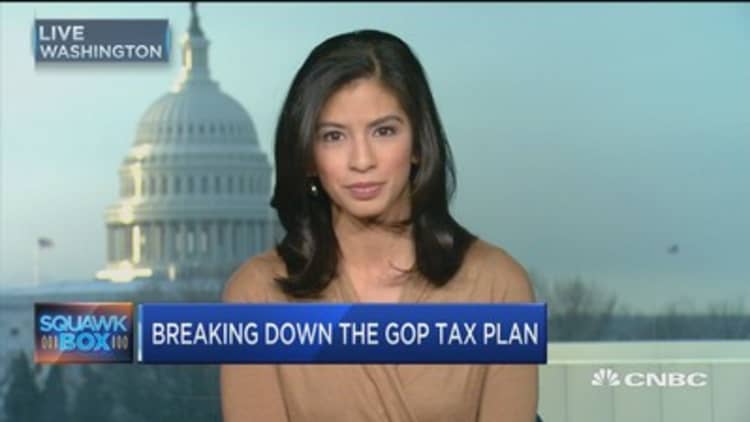
There's a new flash point emerging in the debate over rewriting the nation's tax code: corporate interest deduction.
That's the tax break that companies get on the cost of borrowing money — sort of like the deduction that homeowners get for mortgage interest. Businesses count on it to reduce their corporate tax burden, and it's primarily benefited industries that rely heavily on debt, such as real estate, property development and energy.
The Republican blueprint for tax reform would eliminate the deduction, a move the conservative Tax Foundation estimates would boost federal revenues by $1.2 trillion over a decade. That makes it the biggest single corporate pay-for in the GOP proposal — bigger even than the hotly debated border adjustment tax, which would raise $1.1 trillion over the same period.
Now, businesses are banding together to save the deduction. A newly formed coalition of companies and trade groups spanning the real estate, telecom and finance industries are meeting with lawmakers on Capitol Hill this week to warn about the potential consequences of eliminating the tax break. They're calling themselves BUILD, or Business United for Interest and Loan Deductibility.
"Our view is the elimination of interest deductibility is detrimental to our industry," said Bob DeWitt, a coalition member and chief executive of Boston-based GID, a multifamily housing developer. "The conclusion is that ultimately it will end up reducing the amount of supply that we can add. It will increase the costs of doing business, and as a consequence, it's going to increase rents."
Getting rid of the deduction essentially makes debt more expensive, the group argues. And the higher the cost of erecting an apartment building, the more developers will have to charge the people who live in them.
The impact on housing affordability is one of the main messages the BUILD Coalition is making on the Hill. Among their stops: members of the powerful House Ways and Means committee — which is responsible for writing tax law — members of the banking and finance committees in the Senate, and leadership from both chambers of Congress.
Would their industry be better off if the deduction was preserved? Sure. But they aren't coming away empty-handed from this tax bill, and other sectors need the break more than they do.Alan Coleeconomist, Tax Foundation
But House Republicans counter that the interest deduction will be replaced by other reforms long sought by businesses. That includes lowering the headline corporate tax rate to 20 percent, and the immediate full expensing of capital investments. And proponents of ending the deduction say that incentivizing the real estate industry to rely more on equity and less on debt could be beneficial in the long run.
"Would their industry be better off if the deduction was preserved? Sure," said Alan Cole, an economist at the Tax Foundation. "But they aren't coming away empty-handed from this tax bill, and other sectors need the break more than they do."
President Donald Trump has not specifically weighed in on the issue, though the longtime real estate developer has often referred to himself as "the king of debt." And the tax plan he released during the campaign allows manufacturing companies to choose between full expensing and net interest deductions. The White House has not provided additional details since then, despite assurances that a tax plan is forthcoming.
"I think he understands our cause, and I think he will be sympathetic," DeWitt told CNBC. "I'm not sure how much he's paid attention to the details — and again, there aren't many details — so we need to flesh the bill out."
BUILD commissioned an analysis of company earnings calls dating from the time the House tax proposal was released in summer 2016 through February. Out of 471 calls that mentioned tax reform, the group found, nearly 17 percent brought up the interest deduction. It was the second-biggest tax issue discussed, behind border adjustment.
And the group points out that there could be far-reaching ripple effects of eliminating the deduction. Hospitals, for example, have a debt-to-capital ratio of 63 percent. That's higher than the trucking sector, which is at 48 percent. The real estate sector sits at 43 percent.
"We're willing to look at the entire package — it's a big package," said David Schwartz, an officer at the National Multifamily Housing Council and co-founder of Waterton Associates. "But this is probably the most objectionable part of the whole blueprint."

